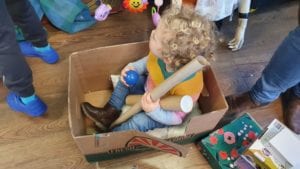 Being in lockdown (mandated to stay home because a man armed with explosives was nearby) left me feeling powerless. The sense of powerlessness was horrifying, humbling and deeply real. For some children and adults around the world, this lack of control is a constant reality. For others, it may come from the chaos of everyday mishaps – lost keys, forgotten school events or spilled coffee on a busy day.
Being in lockdown (mandated to stay home because a man armed with explosives was nearby) left me feeling powerless. The sense of powerlessness was horrifying, humbling and deeply real. For some children and adults around the world, this lack of control is a constant reality. For others, it may come from the chaos of everyday mishaps – lost keys, forgotten school events or spilled coffee on a busy day.How play gives children comfort and control
Children create their own sense of comfort by controlling their world in the safe space of play. This autonomy is crucial. Imagine a child playing “Mommy and baby” and always insisting on being Mommy. This role-reversal allows them to feel in control, practicing authority in a way that feels safe. Similarly, a child who wants to be the superhero, evil witch or bad monster might be working through feelings of vulnerability by taking on powerful roles.
As adults, we can support this empowerment through play. First, we must provide children with time and space to play freely. Then, when we see the spark of power in their eyes as they fully engage in their play, we shouldn’t feel threatened or out of control. Instead, we should celebrate their growing confidence and understanding.
Empowerment through play
Together, we can support child-directed play and help children feel powerful in their own lives. Contact us and join the movement to support child-directed play for all children.